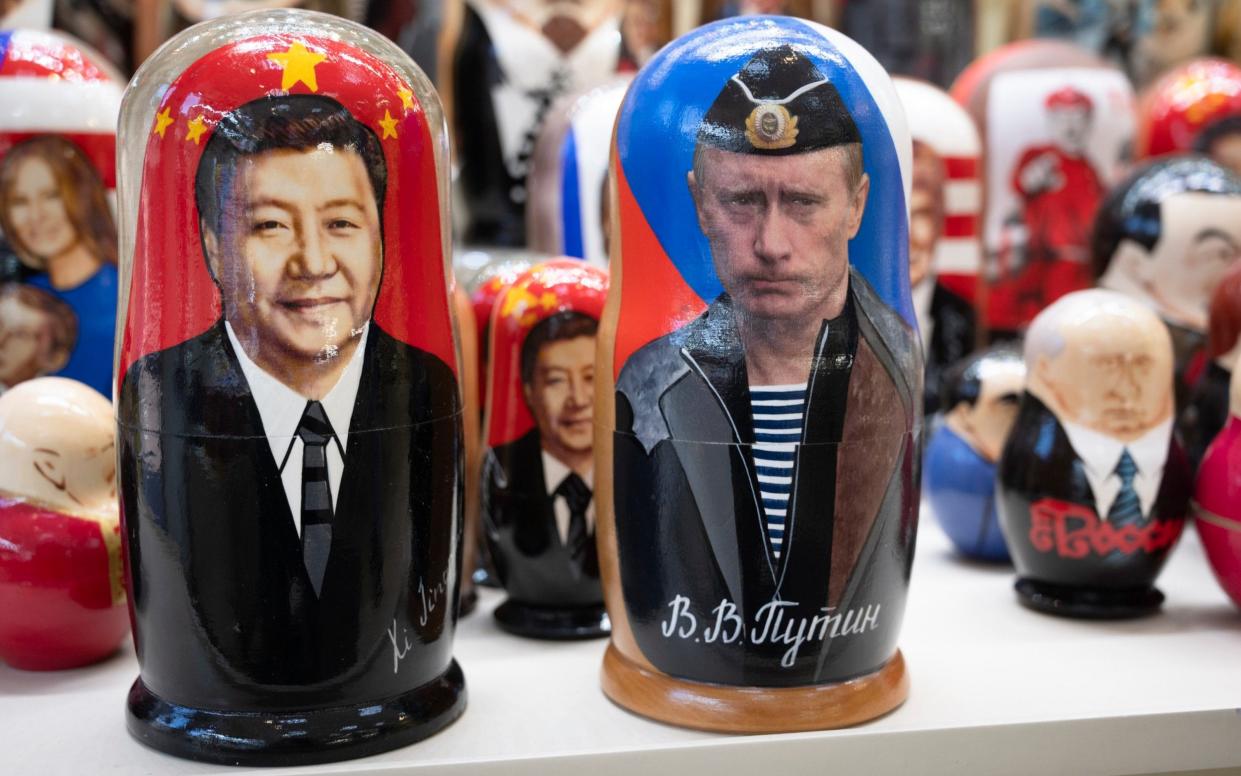Ukraine could just be a skirmish in Xi and Putin’s new world order

- Oops!Something went wrong.Please try again later.
- Oops!Something went wrong.Please try again later.
Two weeks ago the latest Government threat assessment was presented to Parliament. It made for grim reading. “There is a growing prospect that the international security environment will further deteriorate in the coming years… the risk of escalation is greater than at any time in decades”.
Not since the Cold War has Downing Street presented such a bleak picture of where our world is heading. Our world is being divided into two competing spheres of influence, with Russia and China promoting a post-Western global order more favourable to their own authoritarian models of government than to open and transparent democracy.
And yet faced with a China-Russia axis growing in confidence, the West finds itself in denial, the international institutions established to safeguard world affairs paralysed. Ukraine is the most obvious manifestation of this new conflict, and Nato countries have managed to organise assistance for the beleaguered forces of Kyiv. But it could yet prove only an opening skirmish in a new and more complex confrontation.
Globalisation as we once knew it is dying. What will replace it is unclear. Historians may well come to look back on 2023 as the year which set the fate of the century. If the dominoes in Ukraine fall one way, Putin will not only survive but thrive, claiming victory as the conflict stagnates to a stalemate and Western support fragments and decays.
This outcome is still very much on the table. Despite a litany of tactical blunders at the start of the conflict, horrendous casualties, powerful sanctions and the loss of hundreds of combat vehicles, Putin’s narrative still casts a powerful spell over the Russian people. Far too many believe the war to be a necessary step in finally checking Nato’s eastern advance towards the motherland.
And as history tells us, enduring hardship is what Russia does well. If Putin can see out this year, then he may well have weathered the Western storm. The frontrunners for the Republican nomination are clearly less interested in supporting Ukraine than President Joe Biden, and discontent with the conflict is rising elsewhere. In this future, Putin could well find himself with a free hand in his attempts to return other chunks of the old Warsaw Pact terrain back into his sphere of influence.
But if the dominoes fall the other way, another future is possible. Ukraine will secure the additional military hardware it needs to punch through Russia’s defences, liberate the Donbas, push the Russians out of Crimea, and win a victory that will echo throughout history. In this world, Putin’s days will be numbered, and Moscow’s territorial ambitions greatly circumscribed.
Right now, we stand balanced between these two possible futures. Despite much self-congratulation by Western nations pleased that Ukraine has not yet been defeated, at the rekindling of purpose for Nato and by their own willingness to provide Kyiv with military hardware, it remains an uncomfortable truth that it took them far too long to stand up to Putin’s threats and bluster, and that the rest of the world is not necessarily with them.
Far too many countries outside the West have not signed up to sanctions against Russia, and while the ICC’s arrest warrant for Putin will help invigorate Western support for Ukraine, President Xi Jinping’s visit will ensure a far larger number of states across the world remain curiously quiet about this blatant illegal invasion. It will also be used within Russia to illustrate that Putin still has powerful friends who support his cause.
Xi’s visit to Moscow underlines that he, too, understands how pivotal the outcome of the war in Ukraine could be. Current trends indicate that this century will be defined by the outcome of an eventual clash between America and China. Having Russia on its side could well prove helpful to Beijing, while if Putin fails in Ukraine and Moscow tilts to the West, China could find itself isolated. The dominoes will fall in 2023. We should not let fate decide which way.
Tobias Ellwood MP is Chair of the House of Commons Defence Committee
Colonel (Retd) Hamish de Bretton-Gordon OBE is a former commander of UK and CBRN Forces

